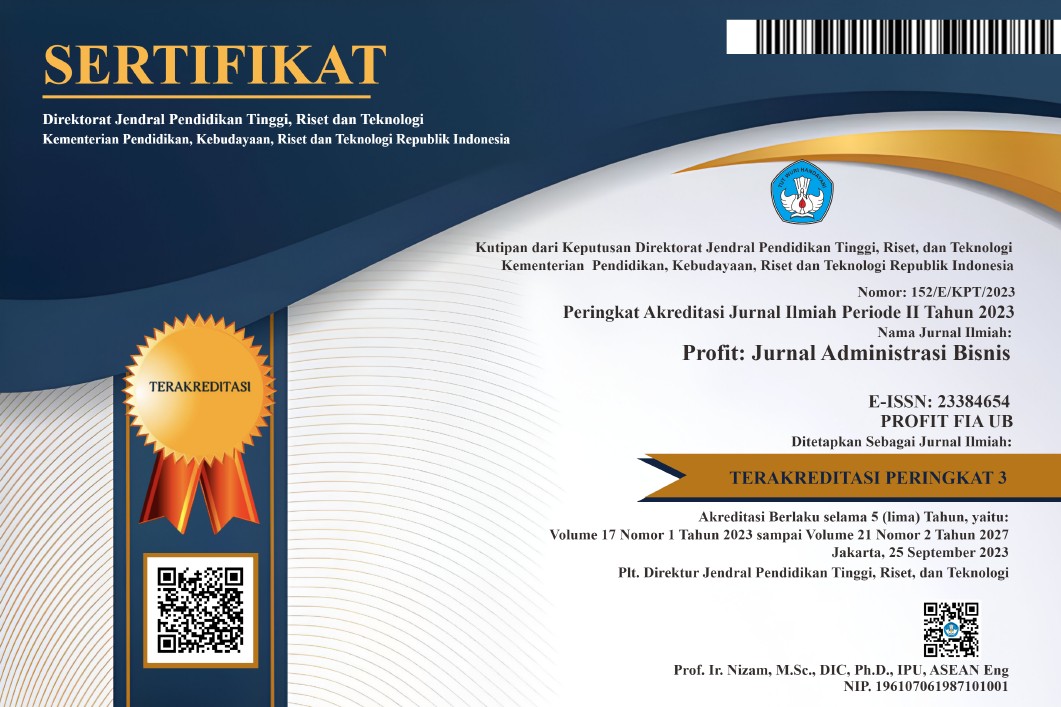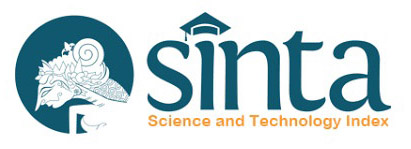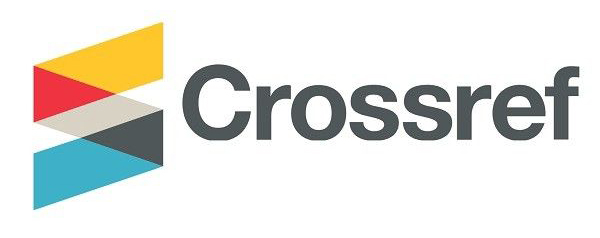ENTREPRENEURSHIP INTENTION: THE EFFECT OF FEAR AND ANXIETY OF COVID-19 AND OPPORTUNITY RECOGNITION
DOI:
https://doi.org/10.21776/ub.profit.2022.-16.01.9Keywords:
Entrepreneurship Intention, Self-Efficacy, Fear and Anxiety of Covid-19, Opportunity RecognitionAbstract
The purpose of the study was to determine the effect of fear and anxiety of Covid-19 and opportunity recognition on self-efficacy and entrepreneurial intentions during the Coronavirus pandemic. The research sample consisted of 225 students of the Department of Business Administration, Universitas Brawijaya using purposive sampling. The hypothesis in this study was tested using PLS (Partial Least Square) analysis. The results showed that fear and anxiety in Covid-19 and opportunity recognition had a significant effect on self-efficacy, and opportunity recognition and self-efficacy had a significant effect on entrepreneurial intentions. Meanwhile, fear and anxiety of Covid-19 did not have a significant effect on entrepreneurial intentions. This research contributes practically by giving consideration to the University and policymakers to increase the intention and entrepreneurial activity of the student.
References
Ajzen, I., 1991, The theory of planned behaviour. Organisational Behaviour and Human Decision Processes 50. p.179-211.
Amoros, J.E., Ciravegna, L., Mandakovic, V., & Stenholm, P. (2019). Necessity or Opportunity? The Effects of State Fragility and Economic Development on Entrepreneurial Efforts. Entrepreneurship Theory and Practices,
Arora, S., Chaudhary, P., & Singh, R.K. (2021). Impact of coronavirus and online exam anxiety on self-efficacy: the moderating role of coping strategy. Interactive Technology and Smart Education, 1741-5659.
Baharuddin, G., & Ab Rahman, A. (2021). What is the most effective antecedent for developing entrepreneurial intention among Muslim youth in Indonesia?. Entrepreneurial Business and Economics Review, 9(1), 75-88.
Bandura, A. (1977). Social Learning Theory. Englewood Cliffs, NJ: Prentice Hall.
Byrne, B. (2010). Structural equation modelling with AMOS: Basic concepts, applications and programming (6th ed.). New York, USA: Taylor & Francis Group.
Calear, A.L., Batterham, P.J., Torok, M., & McCallum, S. (2021). Help-seeking attitudes and intentions for generalised anxiety disorder in adolescents: the role of anxiety literacy and stigma. European Child & Adolescent Psychiatry, 30(2), 243-251.
Creswell, John W. 2009. Research Design (Qualitative, Quantitative, and Mixed MethodsApproach). Los Angeles: SAGE Publications, Inc. Example”, Organizational Dynamics Journal, pp. 8.
Doanh, D.C. (2021b). The impact of fear and anxiety of covid-19 on life satisfaction: Psychological distress and sleep disturbance as mediators. Personality and Individual Differences, 178, 110869.
Dubey, S., Biswas, P., Ghosh, R., Chatterjee, S., Dubey, M.J., Chatterjee, S., Lahiri, D., & Lavie, C.J. (2020). Psychosocial impact of COVID-19. Diabetes & Metabolic Syndrome, 14(5), 779-788.
Elnadi, M., & Gheith, M. (2021). Entrepreneurial ecosystem, entrepreneurial self-efficacy, and entrepreneurial intention in higher education: Evidence from Saudi Arabia. The International Journal of Management Education, 100458.
Elsalem, L., Al-Azzam, N., Jumah, A., Obeidat, N., Sindiani, A.M., & Kheirallah, K.A. (2020). Stress and behavioural changes with remote E-exams during the Covid-19 pandemic: A cross-sectional study among undergraduates of medical sciences. Annals of Medicine and Surgency, 40, 271-279.
Ertz, M., Karakas, F., & Sarigollu, E. (2016). Exploring pro-environmental behaviours of consumers: An analysis of contextual factors, attitude, and behaviours. Journal of Business Research, 69, 3971-3980.
Fauzi, M.A., Martin, T., & Ravesangar, K. (2021). The influence of transformational leadership on Malaysian students’ entrepreneurial behaviour. Entrepreneurial Business and Economics Review, 9(1), 89-103.
Fayolle, A., & Linan, F. (2014). The future of research on entrepreneurial intentions. Journal of Business Research, 67(5), 663-666.
Feng, L., Dong, Z., Yan, R., Wu, X., Ma, J., & Zeng, Y. (2020). Psychological distress in the shadow of the Covid-19 pandemic: Preliminary development of an assessment scale. Psychiatry Research, 291, 113202.
Gartner, W. B., Shaver, K. G., & Liao, J. (2008). Opportunities as attributions: Categorizing strategic issues from an attributional perspective. Strategic Entrepreneurship Journal, 2(4), 301-315.
Gieure, C., Benavides-Espinosa, M.M., & Roig-Bobon, S. (2020). The entrepreneurial process: The link between intentions and behaviour. Journal of Business Research, 112, 541-548.
Giones, F., Brem, A., Pollack, J.M., Michaelis, T.L., Klyver, K., & Brinckmann, J. (2020). Revising entrepreneurial action in response to exogenous shocks: Considering the COVID-19 pandemic. Journal of Business Venturing Insights, 14, e.00186.
Gorgievski, M.J., Bakker, A.B., Schaufeli, W.B., van der Veen, H.B., & Giesen, C.W.M. (2010). Financial problems and psychological distress: Investigating reciprocal effects among business owners. Journal of Occupational and Organizational Psychology, 83, 513-530.
Gubik, A.S., & Bartha, Z. (2018). The role of university in influencing the entrepreneurial intention of university students. International Entrepreneurship Review, 4(3), 177-188.
Hassan, A., Saleem, I., Anwar, I., & Hussain, S.A. (2020). Entrepreneurial intention of Indian university students: the role of opportunity recognition and entrepreneurship education. Education + Training, 62(7/8), 843-861
Hernández-Sánchez, B.R., Cardella, G.M., & Sánchez-García, J.C. (2020). Psychological Factors that Lessen the Impact of COVID-19 on the Self-Employment Intention of Business Administration and Economics’ Students from Latin America. International Journal of Environmental Research and Public Health, 17, 5293.
Kementrian Kesehatan RI. (2020). Situasi Terkini Perkembangan Coronavirus Disease (COVID-19) 26 April 2020. Diperoleh 7 Juni 2021 dari https://infeksiemerging.kemkes.go.id/situasi-infeksi-emerging/situasi-terkini-perkembangan -coronavirus-disease-covid-19-26-april-2020.
Krueger, N. Jr., Reilly, M. dan Carsrud, 2000, A.Competing models of entrepreneurial intentions, Journal of Business Venturing, v.15, n. 5/6, p. 411-32.
Lee-Ross, D. (2017). An examination of the entrepreneurial intent of MBA students in Australia using the entrepreneurial intention questionnaire. Journal of Management Development, 36(9), 1180-1190.
Linan, F., Rodriguez-Cohard, J.C dan Rueda-Cantuche, J.M., 2011, Factors affecting entrepreneurial intention levels: a role for education. International Entrepreneurship and Management Journal 7(2), 195- 218.
Loan, L. T., Doanh, D. C., Thang, H. N., Viet Nga, N. T., Van, P. T., & Hoa, P. T. (2021). Entrepreneurial behaviour: The effects of fear and anxiety of Covid-19 and business opportunity recognition. Entrepreneurial Business and Economics Review, 9(3), 7-23.
Mahmood, T.M.A.T., Mamun, A.A., Ahmad, G.B., & Ibrahim, M.D. (2019). Predicting entrepreneurial intentions and pre-start-up behaviour among Asnaf millennials. Sustainability, 11, 4939.
Ucbasaran, D., Westhead, P., & Wright, M. (2009). The extent and nature of opportunity identification by experienced entrepreneurs. Journal of business venturing, 24(2), 99-115.
Shepherd, D.A., Williams, T.A., & Patzelt, H. (2015). Thinking About Entrepreneurial Decision Making: Review and Research Agenda. Journal of Management, 41(1), 11-46.
Downloads
Published
Issue
Section
License

This work is licensed under a Creative Commons Attribution-NonCommercial 4.0 International License.
The copyright of the received article shall be assigned to the journal as the publisher of the journal. The intended copyright includes the right to publish the article in various forms (including reprints). The journal maintains the publishing rights to the published articles.

This work is licensed under a
Creative Commons Attribution-NonCommercial 4.0 International License

















